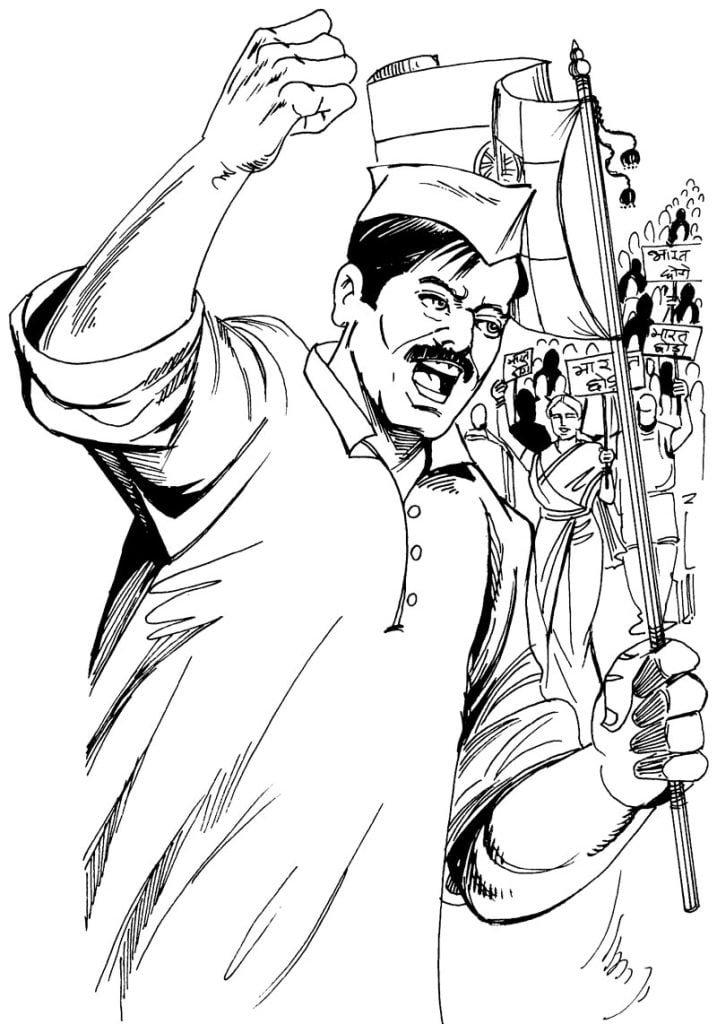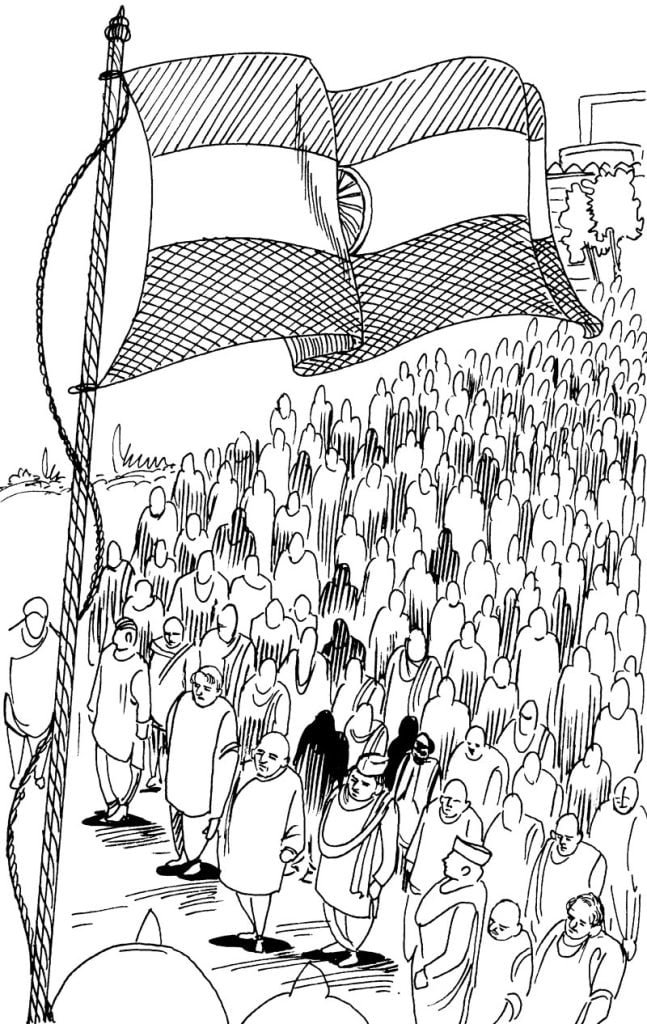After the failure of Cripps mission the Congress passed a resolution calling for the Britishers to quit India. The resolution was passed on the midnight of 8th August 1942 by the All-India Congress Committee at Bombay. The resolution sought the withdrawal of British rule from India as an urgent necessity both for India and for the success of the cause of U.K.
As anticipated by Vallabhbhai, a few hours after the resolution was passed the government arrested all the important leaders of the Congress. Gandhiji was taken to Aga Khan’s palace and Vallabhbhai along with Nehru and others were locked up in Ahmadnagar Fort. The arrests of the leaders were followed by widespread disturbances. People had taken by the mission of ‘Do or Die’ and many took part in the struggle—some non-violently others violently. Government resorted to ruthless repressive measures. Even according to their moderate estimate more than 1000 people were killed and 3000 seriously injured. For sometime it seemed that the struggle would succeed. But because of lack of leadership the struggle took various forms and died out.

By the middle of 1944 Vallabhbhai along with Shankarrao Deo was shifted to Yervada jail, Poona. For a year he remained there and was released on 15th June 1945 along with other leaders to enable them to attend the Simla Conference.
Lord Wavell, who had replaced Lord Linlithgow, was sympathetic to India and was reported to have said that he would ‘lead India a long way down the road towards independence and freedom.’ His first step in this direction was the release of all political leaders. He invited a conference of 21 leaders from all parties at Simla.
The conference met at Simla on June 25, 1945. Gandhiji and Vallabhbhai went to Simla but did not participate in the conference. The conference failed because of Mr. Jinnah. Vallabhbhai was unhappy over the failure of the conference, for it revealed that during the three years the Congress was outlawed, Jinnah had used all his energy in strengthening his party. And it had become so powerful that Jinnah had acquired the power of veto in political matters.
India’s chances however brightened when the labour government came to power on 26 July 1945. The labour government lost no time and on 19th September 1945 the P.M. Clement Attlee announced that provincial autonomy would be restored to India after the elections, a constituent assembly would be set up as soon as possible to frame out future constitution and the Viceroy’s Council would be reconstituted in consultation with the principal Indian parties. This announcement was joyously greeted and the people felt that for the first time government meant business. Both the Congress and the League started campaigning for the ensuing elections.
It again fell to the lot of Vallabhbhai as chairman of the Parliamentary Committee to raise funds, select candidates and to campaign for the election. In spite of his ill-health he undertook the task.
As in 1937, Vallabhbhai proved himself equal to the task. The election results were a tribute to his organizing capacity. The Congress had been outward during the past three years and Jinnah had utilized his genius, through negative, to strengthen his party with the slogan, ‘Islam in Danger’, ‘Congress is a Hindu Party’. It was feared that Congress might not fare too well. But thanks to the efforts of Patel, Congress won 91% of the general seats in the central legislature and a clear majority in eight provinces.
Prime Minister Attlee sent a Cabinet Mission to help India to attain freedom as speedily and as fully as possible. The Cabinet Mission reached India on March 23, 1946. The arrival of the Cabinet Mission convinced Indians that the British Government was serious about transferring power. The mission consulted 472 leaders of various parties and communities including the leaders of the Congress and the League. To resolve the Congress-League differences a special conference was called in Simla in which representatives of both the parties participated.
The Congress was opposed to partition and the League insisted on it. Faced with a deadlock the Cabinet Mission made its own proposals on May 16. It envisaged a three-tier constitutional structure for India composed of the Union the groups of states and the states. The union had only limited powers and the states and the groups of states had the right of secession from the union. The mission also accepted the demand for the formation of a Constituent Assembly by election of its members by the provincial legislatures to draft a constitution for free India. It further advised the setting up of an Interim Government till the new constitution came into being.
The plan did not agree for the creation of Pakistan but still it appealed to the Muslim League for it provided for the status and the groups of states right of secession. And for that very reason Vallabhbhai called the plan cumbersome and was rather unhappy about it. But still the Congress accepted the plan. The League also accepted it but with reservation.
When the time came for the formation of Interim Government, the Congress refused to concede the demand of the League to nominate all the Muslim members. Jinnah had hoped that if the Congress refused to form a government he would be called to do so. But Wavell saw no point in forming a government without the Congress and he dropped the idea of the formation of Interim Government. This infuriated Jinnah. He accused the British government and announced in a mood of frustation that today we bid good bye to constitutional method. He fixed August 16 as ‘Direct Action Day’ and told his followers—
“Today we have forged a pistol and are in a position to use it’. In a press conference he said that he was going to make trouble. When asked if that meant violence he declined to ‘discuss ethics’.
In this atmosphere of high tension, mutual distrust and communal riots, the Viceroy wanted to divert himself of responsibility and invited Jawaharlal Nehru, the President of the Congress to form an Interim Government alone if Jinnah’s cooperation was not forthcoming.
Jinnah was furious at the way he had been shubbed his prestige had gone down. But he was a shrewd man and tactfully he opened negotiation with the Viceroy and told him that the League was keen to join the council. The Viceroy agreed and the five members of the League joined the council on October 26th. The aim of these members was not to cooperate but to sabotage the government from within.
Even after joining the coalition government league members continued to invite people to violence. The League supplied arms and weapons and serious riots broke out in Noakhali and Tipperah districts on October 15. Plunder, destruction of property, murder and dishonouring of women were perparated on a large scale. The P.M. issued a statement on February 20 which implied that the country would have to be partitioned unless Congress and the League united.
It was in this critical and frightful situation that Lord Mountbatten was sworn in as the new Viceroy on March 24, 1947. With the arrival of Lord Mountbatten things began to move fast. Even before his arrival, Vallabhbhai was convinced after working for about seven months with the League ministers that partition was the only way out.

Soon a scheme of partition and transfer of power was evolved. This plan was accepted by all the parties in a conference held on 3rd June. It came to be known as the 3rd June plan or the Mountbatten Plan. But Jinnah again tried to create trouble by asking for an 80 mile long corridor to join East Bengal and West Pakistan. Jinnah, thought he had accepted the 3rd June plan, now reiterated his demand for full provinces of the Punjab and Bengal. Thereupon Mountbatten told him firmly that either he shunted their to his decision or go without a Pakistan. So he yielded. And Mountbatten announced on 3rd June that India and Pakistan would get independence on 15th August and 14th August 1947 respectively. The British were true to their word and gave freedom to India and Pakistan.
Vallabhbhai was happy at seeing his life’s aim of India’s independence materealized but he was conscious of the tasks ahead. He said, “Let us not forget, in the joy of the hour, the stupendous responsibilities and obligations which freedom has brought within its wake. Our primary duty is zealously to guard on freedom against dangers from without and from within”.
